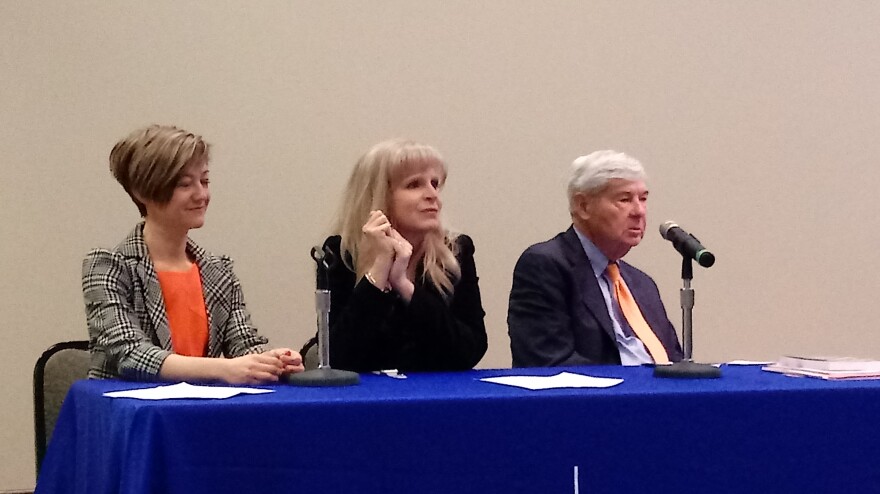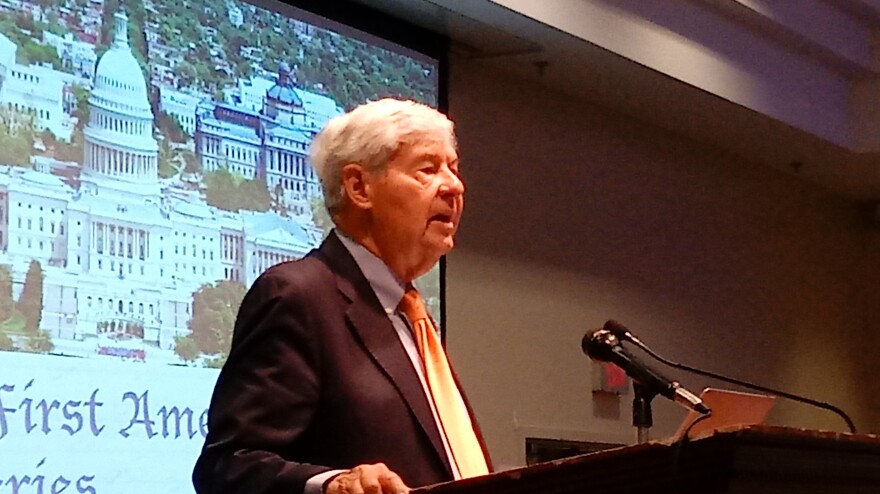Former Florida Governor and U.S. Senator Bob Graham visited Pensacola on Tuesday, making appearances at the University of West Florida and downtown.
Graham’s first stop was at UWF’s Conference Center, as the main speaker at the inaugural Seligman First Amendment Lecture Series, to deliver a presentation on the “Art of Public Dialogue."
“Democracy was never intended to be passive,” said Graham. “From the very beginning democracy – government by the people – was designed to be a government that emphasized citizen involvement.”
During his talk Graham said he’s worried about the state of democracy in America, after looking at the numbers. Seventy-two percent of Americans from the “Greatest Generation” voted in the 2016 election, compared to 48 percent of Millennials.
“Something is wrong that young people don’t see the importance of their participation in our democracy as their grandparents see it,” Graham said.
One reason, theorizes Graham, is the reduction and outright halt to teaching civics in middle and high schools in the 1970s. Florida is an exception, under a law passed in 2009 mandating such courses in the seventh grade. Another concern is a decline in organizations devoted to civic endeavors.

“Whether it’s the League of Women Voters, Kiwanis, [or] PTA; nationally today, less than six percent of American belong to any organization that has a civic mission,” said Graham. “And unfortunately in Florida, less than four percent.”
“Voting can’t be the only time that we contribute to democracy; civic democracy and effective public discourse take a couple of things,” said Kelly Carr, an assistant professor of communication and a series co-organizer.
The first thing is “practice” – which Carr believes is a cornerstone of civic engagement.
“We go to vote when the election cycle comes up; we attend public meetings only when we are angry about a particular issue, instead of engaging with democratic discourse regularly,” said Carr.
This can be done via social media, but Carr prefers an old school approach: face-to-face meetings that can be done with local groups.
“Civic democratic starts with our neighbors, and it need not be overt and political to in order to meet the standards of a civic democracy,” said Carr. “Which include working toward the common good; consolidating support into action, offering good reasons, listening, and amending our beliefs based on new information.”
The program’s other co-organizer is Jocelyn Evans, an Associate Dean and a professor of government at UWF. She spoke of how technology can turn a teleconference or social media into a town hall meeting for officeholders who want to avoid a possibly hostile crowd.
“They feel like they can’t get a handle on who of this mob represents their constituents,” Evans said. “And who represents some outside group that came in and staged this to catch them. To avoid a hostile climate, to avoid a waste of time; to prevent uncivil and unruly behavior, [and] to avoid a media spectacle.”
Another advantage is that the host can reach a larger number of people that those crowding into a relatively smaller room or hall, and it give him or her some leeway in addressing issues.
“The advantage of Facebook Live or these types of virtual spaces is that a member can engage that comment or not, based on own discretion,” said Evans. “The member can have a staff member, who’s screening those comments and feeding a select question at the appropriate moment.”
Former Sen. Bob Graham’s other stop in Pensacola was a late afternoon appearance at Pensacola Little Theater, as part of the CivicCon series.



